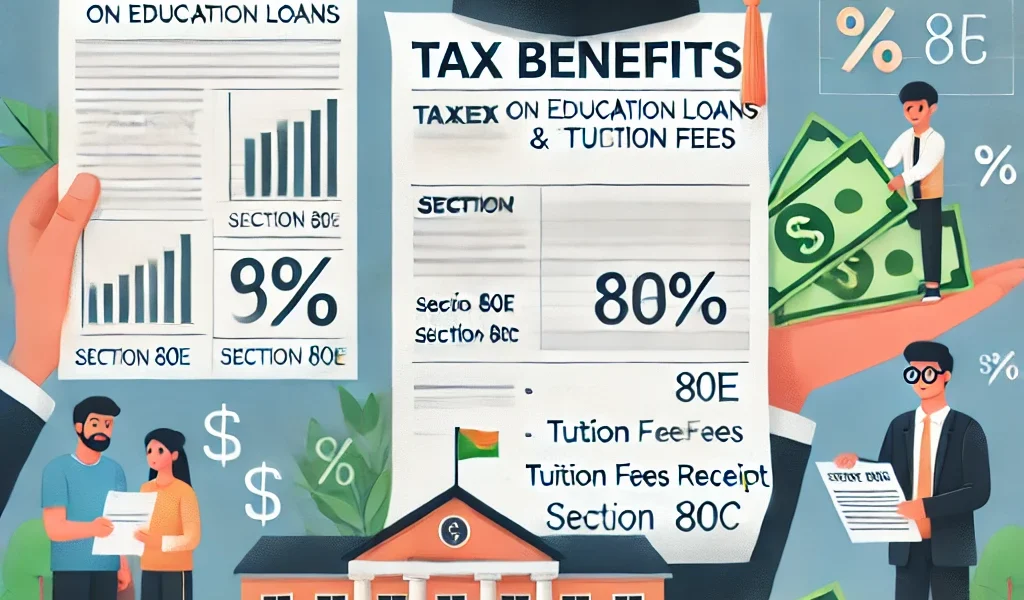Education is one of the most significant investments in a person’s life, and the government provides several tax benefits to ease the financial burden on students and parents. By understanding and utilizing these tax deductions properly, taxpayers can significantly reduce their taxable income. In this guide, we will explore the various tax benefits available on education loans and tuition fees, ensuring that you can claim them legally and effectively.
Understanding Tax Benefits on Education Loans
Education loans are an essential financial tool that helps students and parents manage the high costs of education. To encourage higher education, the government offers tax benefits under Section 80E of the Income Tax Act.
1. Eligibility Criteria for Claiming Tax Benefits on Education Loans
- The loan must be taken from a recognized financial institution or a charitable organization.
- The loan should be for higher education (in India or abroad) for the taxpayer, spouse, children, or a legal ward.
- The benefit is applicable only on interest paid on the loan, not on the principal amount.
- The deduction is available for eight consecutive years or until the interest is fully repaid, whichever is earlier.
2. How to Claim Tax Benefits on Education Loan Interest
- Ensure that the loan is taken from an approved lender (banks, NBFCs, etc.).
- Keep records of loan statements showing the interest payments made during the financial year.
- While filing the Income Tax Return (ITR), claim the deduction under Section 80E.
- There is no upper limit on the amount of interest that can be claimed.
Tax Benefits on Tuition Fees
Taxpayers can also claim deductions for tuition fees paid for the education of their children under Section 80C of the Income Tax Act. This provision allows individuals to reduce their taxable income by a significant amount.
1. Eligibility Criteria for Tuition Fee Deduction
- The deduction is available only for tuition fees, not for other expenses like donations, development fees, or transportation.
- The fees must be paid for full-time education at any school, college, university, or educational institution in India.
- Only two children per taxpayer are eligible for the deduction.
- The deduction is available for individuals and Hindu Undivided Families (HUFs) but not for companies or firms.
- The maximum deduction allowed is ₹1,50,000 per year (including other eligible investments under Section 80C).
2. How to Claim Tax Benefits on Tuition Fees
- Maintain receipts of tuition fee payments and ensure they clearly state the amount paid.
- Ensure that the fee is paid to a recognized institution.
- While filing your ITR, claim the deduction under Section 80C.
- If both parents are taxpayers, they can split the deduction between them to maximize tax benefits.
Additional Tax Benefits Related to Education
Apart from the above deductions, here are a few other provisions that taxpayers should be aware of:
1. Deduction Under Section 10(14) – Children’s Education Allowance
- Employees receiving a Children’s Education Allowance from their employer can claim an exemption of up to ₹100 per month per child (up to two children).
2. Scholarships and Financial Assistance
- Scholarships received for education purposes are exempt from tax under Section 10(16).
3. Deduction on Coaching Fees or Other Educational Expenses
- Expenses such as coaching fees or extracurricular training do not qualify under Section 80C.
Common Mistakes to Avoid When Claiming Tax Benefits
- Not maintaining proper documentation: Keep all receipts, bank statements, and loan documents.
- Claiming benefits on non-eligible expenses: Ensure that only tuition fees and loan interest are claimed.
- Not checking the institution’s eligibility: Verify that the institution qualifies under the Income Tax Act.
- Failing to claim deductions in the right assessment year: Ensure deductions are claimed within the applicable financial years.
Conclusion
Claiming tax benefits on education loans and tuition fees can provide significant financial relief. By understanding the provisions of Section 80E and Section 80C, taxpayers can legally and efficiently reduce their taxable income. However, it is essential to comply with the guidelines, maintain proper documentation, and seek professional advice if required. Proper tax planning can help maximize savings and ensure that education remains financially manageable.




